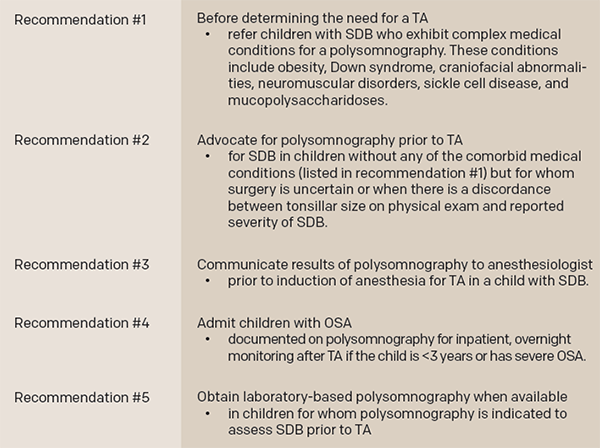
AAO-HNS Recommendations for When to Order a Sleep Study Prior to Adenotonsillectomy
TA, adenotonsillectomy; SDB, sleep-disordered breathing; OSA, obstructive sleep apnea
Source: AAO-HNS
For Dr. Ishman, children who present with few symptoms and very large tonsils fall into a group for which she often uses a sleep study prior to surgery to rule out unnecessary surgeries. “There are a group of kids who come in without many symptoms but with very large tonsils for whom surgery may not be necessary or the family may not be comfortable with surgery that is not absolutely necessary,” she said. “If you’re not sure that the symptoms and clinical exam match, I think sleep studies make a lot of sense.”
Explore This Issue
September 2016She emphasized, however, that most children with symptoms—and, particularly, daytime symptoms—and enlarged tonsils do not need a sleep study prior to surgery.
Other Considerations
Other children for whom Dr. Ishman says a sleep study prior to TA may be beneficial include those who are at high risk for postoperative complications if a sleep study will affect their management, such as changing their status from outpatient to inpatient or moving them from a floor bed to an intermediate care or ICU bed.
In addition, she emphasized that a sleep study is warranted for children with additional suspected sleep issues.
Feasibility
An important issue for otolaryngologists to consider when weighing the benefit of a sleep study is feasibility and accessibility for the patient. Highlighting the cost and time it takes to perform a sleep study, Dr. Ishman also emphasized the reality that a sleep study is not available to all patients.
She said the AAP guideline recognized this in its suggestion that clinicians consider other diagnostic options when a sleep study is not available. These include providing patients with a home oximetry study, video exam, or audio recording. “None of these is nearly as sensitive or specific as a full sleep study to diagnose sleep apnea,” she said, but she urged clinicians to try these options if a sleep study is desired but not available.
Mary Beth Nierengarten is a freelance medical writer based in Minnesota.
Key Points
- Three clinical guidelines have provided some guidance on when to order a sleep study prior to adenotonsillectomy in children, but the studies differ in their final recommendations.
- Otolaryngologists should understand the difference between sensitivity and specificity of diagnostic tools when determining the value of a sleep study prior to TA.
- Tonsil size is a key component of diagnostic assessment.
- Sleep studies are not always available to all patients.